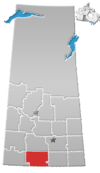Viceroy, Saskatchewan
History
Viceroy was incorporated in 1912. At its peak in the 1950s it had a population of 250. Prior to May 10, 2002, Viceroy was incorporated as a village, and was restructured as a hamlet under the jurisdiction of the Rural municipality of Excel on that date.
Demographics
In the 2021 Census of Population conducted by Statistics Canada, Viceroy had a population of 25 living in 12 of its 19 total private dwellings, a change of 25% from its 2016 population of 20. With a land area of 1.14 km (0.44 sq mi), it had a population density of 21.9/km (56.8/sq mi) in 2021.
| 2011 | |
|---|---|
| Population | 25 (-71.9% from 2006) |
| Land area | 1.18 km (0.46 sq mi) |
| Population density | 21.3/km (55/sq mi) |
| Median age | |
| Private dwellings | 18 (total) |
| Median household income |
Services
Once a bustling community with two schools, two restaurants, Klemenz Poolroom and bowling alley, a theatre and many other businesses. After two fires in the past century the community has shrunk to a much smaller scale. Viceroy still boasts the Viceroy Co-op which in a sense is the local "general store" offering grocery staples, tools, feed, hardware, parts, auto repair and petroleum sales.
The RM of Excel No. 71, office is located on main street with the equipment yard/shop to the south. Bengough Credit Union also operates a branch in Viceroy.
See also
References
- ^ Kathy Gudnason (June 30, 2012). "Viceroy: 100 years of spirit". The Radville Star/The Deep South (living). Retrieved April 21, 2015.
- ^ "Restructured Villages". Saskatchewan Ministry of Municipal Affairs. Archived from the original on March 25, 2008. Retrieved February 10, 2008.
- ^ "Population and dwelling counts: Canada and designated places". Statistics Canada. February 9, 2022. Retrieved August 31, 2022.
- ^ "2011 Community Profiles". 2011 Canadian census. Statistics Canada. March 21, 2019. Retrieved February 24, 2011.
